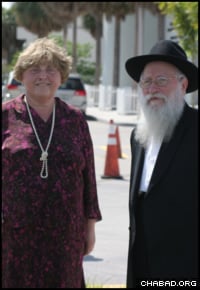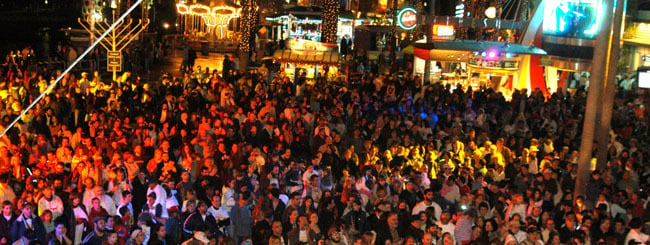Up and down both of Florida’s coasts and throughout its interior, Jewish travelers and residents looking for kosher food, prayer services or Torah classes don’t have to look far. With centers dotted all over the map, from Tallahassee in the north to Miami in the South, and some 145 locations in between, Chabad-Lubavitch of Florida has presided over half a century of growth in the Sunshine State.
A year after their marriage in 1960, Rabbi Abraham and Rivka Korf uprooted themselves from the tight-knit Chasidic community in the Crown Heights section of Brooklyn, N.Y., and headed to Miami Beach on behalf of the Rebbe, Rabbi Menachem M. Schneerson, of righteous memory. What they encountered was a South Florida community on the verge of a vast transformation.
Until the 1940s, most of the state’s Jewish residents were concentrated in the northern ocean port of Jacksonville, but migration southward, coupled with an influx of retirees from out of state and a swell of Jewish immigrants from Latin America and the Caribbean, established Miami as Florida’s Jewish hub.
By 1960, the state had about 175,000 Jewish residents. In an interview days before a gala event celebrating his and his wife’s launch of Chabad-Lubavitch activities in Florida, Abraham Korf remembered that Miami had only three synagogues. The state as a whole had just two ritual baths. When he arrived, milk adhering to the strict kosher standard known as chalav yisrael was unheard of. He found a local dairy and supervised the milking of cows himself.
Educationally speaking, while Miami had modern Jewish day schools, they didn’t suit the needs of the growing Korf family. So they started their own, establishing the Landow Yeshiva in 1966, reflecting a take-charge attitude born in part by the rabbi’s experiences learning in secret underground Jewish schools in the Soviet Union and escaping the oppressions with a fake Polish passport.
“It started off with six children,” Korf, who also serves as spiritual leader of Congregation Beth Hamedrash Levi Yitzchok in Miami Beach, said of the school, “then, 32 children the next year, then 67, and then hundreds. As people started hearing about it, it grew.”
Mirroring the growth of other programs, today, under the umbrella of the Lubavitch Educational Center, what began as the Landow Yeshiva incorporates a preschool, an elementary school, the Beis Chana High School for Girls, and a rabbinical college. The complex serves approximately 800 students.
Along with the school, the Korfs built a synagogue and a Jewish overnight camp. They each led Torah classes. Rivka Korf earned fame among area women for her Saturday afternoon classes on the weekly Torah portion and the Mishnaic tractate known as Pirkei Avot. She also taught public school students about Judaism as part of the release time program at Miami-Dade Public High School.

Feige Knight, who was known back then by the name Teri Veccica, was one of the Korfs’ first students at the yeshiva. She was only six years old when her non-religious family sent her to the school.
“My mother and my grandmother took me to the first [Jewish] school they’d heard of opening in Miami Beach,” says Knight. “Rabbi Korf is the reason that I was able to get a Jewish education. I hold him dear to my heart, and I give him the credit for not allowing my mother to walk out of that office.”
After living in Las Vegas for many years and helping to establish a Chabad House there, Knight moved her own family back to Miami, where they attend The Shul, a Chabad-Lubavitch synagogue in Bal Harbour.
In the Islands
Today, Florida boasts the third-largest Jewish community in the United States with about 750,000 Jews. Some 180 Chabad-Lubavitch emissaries are spread throughout the state, including Rabbi Yaakov and Chanie Zucker, who direct the Chabad Jewish Center of the Florida Keys and Key West.
The Zuckers’ community of approximately 2,000 Jews scattered over the 40-some islands that stretch into the Caribbean Sea reflects the faces of modern Jewry in Florida. There, American retirees live out their golden years, while Israeli expatriates run tourist shops, and families vacation.
“It’s a challenge, but a blessing,” said Yaakov Zucker, who arrived as a newlywed in 1995, sent there by the Korfs and Rabbi Yosef Biston, executive vice president of Chabad-Lubavitch of North Broward and South Palm Beach. “We have to wear many different hats.”
Joy Emanuel-Kohen sends her nine-year-old daughter to the Zuckers’ Hebrew school on Sundays, and attends other programs and events with the rest of her family of five.
“You feel that connection in your heart and soul,” she said. “They have a nice way of making it fun to come to the synagogue. They’re very nice people, happy [and] welcoming.”

Familial Pride
The Zuckers’ approach reflects that of the Korfs, say those who know them.
For the Korfs and their family of five sons and four daughters, “there was never any concept of something outside our mission,” said Leah Jacobson, the couple’s fifth child.
“We all knew from the moment we were born that everything revolved around that,” added Jacobson, who lives in Crown Heights and serves as the secular studies principal at the Beth Rivka girls’ high school. “We took great pride in it.”
The children hardly saw their father during the week, so the holy day of Shabbat was a special time for the family. He would catch up with them and quiz them on their studies. Jacobson remembers being one of the only visibly religious students at her parents’ school, but it didn’t bother her.
“We just knew it was the reason why we were there,” she said. “There was never any judgment.”
There also wasn’t much money.
“We lived on a shoestring budget,” explained Jacobson. “But we had such inner pride in what we were doing. That came from my father. He lived it and breathed it.”
An example was when she was in her second year of post-high school seminary in New York and had a job teaching fifth grade at a boys’ school. She earned $15 an hour and were about to up it to $25 when Beth Rivka offered her a job for just $100 a week. She turned it down.
“Well, somehow my father got wind of this,” she recalled. “I told him it didn’t make sense to take the job and get a quarter of the pay.”
“Leah,” said Korf, “if those were my calculations, the money, I would never have gone [to Florida]. I didn’t raise my children to make those calculations.”
To this day, Korf maintains a hectic schedule supervising activities in Miami, running the synagogue and helping other emissaries throughout the state. When a ritual bath opened in Key West, he was there to help the Zuckers with the grand opening.
When asked about the most rewarding part of the job, he responds with humility, “that we’re emissaries and can do the Rebbe’s work.”






Join the Discussion